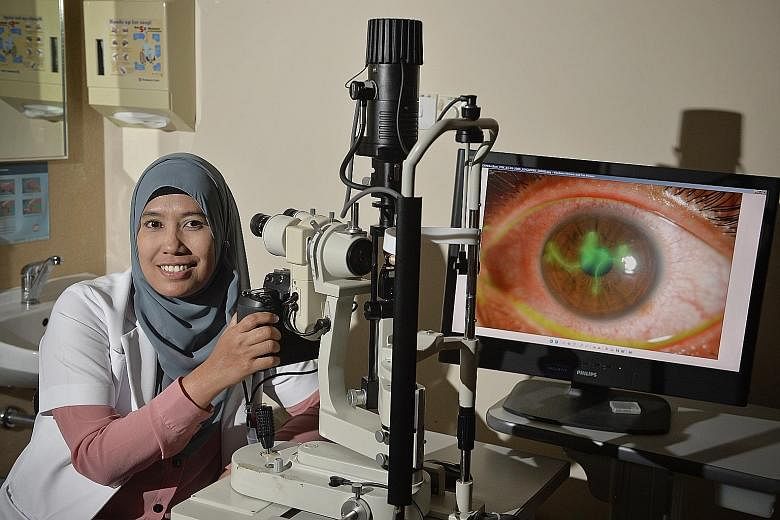Q I specialise in taking pictures of the eyes because...
A This requires both patient management skills and imaging expertise, especially when there is a high patient load. I need to be fast and sharp during the imaging process to minimise any discomfort in the patient's eyes arising from the flashes and bright lighting.
Q One little-known fact about ophthalmic imaging is...
A Every image can help doctors to diagnose problems and prescribe the right treatment promptly.
Just like landscape photography, the images can also be interpreted as a form of art. One can be creative at times when shooting the landscapes of the eyes.
-
Bio Box
-
MS KHATIJAH ABDUL RAHMAN
Age: 44
Occupation: Senior ophthalmic technician at the National Healthcare Group Eye Institute, Tan Tock Seng Hospital (TTSH)
Years ago, when Ms Khatijah worked as a patient service associate in TTSH's department of ophthalmology, she had the chance to speak to ophthalmic technicians and became interested in the job.
Five years later, she made a career switch to become an ophthalmic imaging specialist.
Besides learning on the job to familiarise herself with the different diagnostic equipment and imaging techniques, she was sent to other hospitals and overseas conferences to hone her skills.
Her clinical images of eyes help doctors diagnose eye diseases accurately and plan patients' treatments. She now heads the eye diagnostics team at TTSH and oversees nine other ophthalmic technicians.
She is married to a 47-year-old technical officer. They have four children aged nine to 22.
Q What I do is like being...
A A crime scene investigator. I am always looking into the eye for evidence of any disease or condition. I do this by performing different types of investigations to check for abnormalities in the eye.
I capture images for the eye doctor who, like a judge, hands down the final verdict to patients.
If I cannot trace the source of an abnormality, the patient is my best partner in helping to solve the mystery.
Q A typical day for me would...
A Start at 6am when I prepare breakfast for my family. By 8am, I am at work.
My day revolves around clinic sessions with patients; ensuring all the diagnostic systems and equipment are up and running, and attending departmental meetings.
I could spend up to an hour conducting tests on some patients.
Q I am inspired by...
A Patients who remain positive and motivated despite their physical disabilities.
I see them try their very best to cooperate and endure the imaging process as I trace and capture their eye abnormalities. Some even apologise if they think they are blinking too much.
Q Patients who get my goat are...
A Rare, though some anxious patients may press me to update them about their condition during the tests. I would then explain and advise them to speak to their doctors, who are the best people to interpret the investigation results.
Q Things that put a smile on my face are...
A When I see my patients return for their follow-up care after successful surgery. It is also heartening when long-term patients achieve better vision and are discharged.
I am thrilled when young people are interested in my work and ask how they can join the profession.
Q It breaks my heart when...
A I witness how some of my old friends become frail over the years, especially those with diabetes.
Q I wouldn't trade places for the world because...
A I work in an interesting field which photographs almost every part of the eye.
Some people may cringe when they see these eye images but, to me, these images are beautiful. I regard them as a form of art and my way of helping patients.
Q My best tip...
A Stay positive and do not ever give up hope. Should you have any eye conditions, follow the doctor's advice. For those who have multiple health conditions, keep to your medical appointments as you do not know how the other conditions may affect the eyes.

